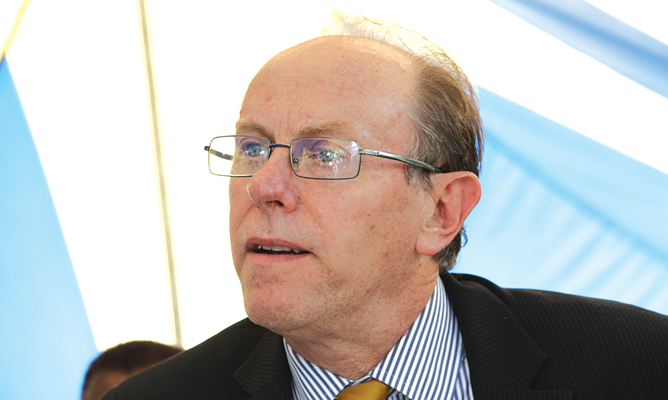
Politician David Coltart, who is also a veteran lawyer, maintains that he stands by remarks contained in his book regarding what Vice-President Emmerson Mnangagwa is reported to have said in 1983, when government deployed the North Korean-trained Five Brigade in Matabeleland and Midlands provinces.
According to human rights activists, the Zimbabwe army allegedly killed at least 20 000 innocent civilians.
The massacres — commonly referred to as Gukurahundi or “washing away dirt” — have reportedly unsettled the vice-president, who is believed to be harbouring presidential ambitions.
Coltart told Studio 7 that he had carried out thorough research for his autobiography titled The Struggle Continues: 50 Years of Tyrany in Zimbabwe saying he stands by what he wrote.
Coltart has become embroiled in a row with Mnangagwa after it emerged that his recently-published book contains claims that sometime in 1983, Mnangagwa — then Security minister —made statements which encouraged violence against civilians, marking the beginning of what came to be known as Gukurahundi.
Coltart said he had relied on some reports in the state-controlled Chronicle newspaper, which he had believed to be true as Mnangagwa never sued the paper for those remarks.
He said, “The specific comments in the book regarding Vice- President Mnangagwa actually came from The Chronicle reports in 1983, which we had access to. And the assumption has always been that The Chronicle then reported accurately.
“Vice-President Mnangagwa never complained about the Chronicle reports of what he said then, and he never sued them in the past 33 years, so one has to assume that he was correctly reported on. And to that extent, yes, I stand by what is written in the book.”
- Chamisa under fire over US$120K donation
- Mavhunga puts DeMbare into Chibuku quarterfinals
- Pension funds bet on Cabora Bassa oilfields
- Councils defy govt fire tender directive
Keep Reading
In a statement, Mnangagwa said he was concerned by remarks in Coltart’s book and that the statements attributed to him were false. He has threatened to sue the senator.
But Coltart has remained steadfast. Asked if he believed that the ordinary majority could still forgive the perpetrators of Gukurahundi given the apparent state intransigence, Coltart — who has in the past urged offenders to apologise for the atrocities — said he believed that the massacres could not be taken in isolation as Zimbabwe has gone through a number of traumatic experiences in the past.
Coltart said he would not be the right person to demand any apology from Gukurahundi perpetrators, but said he believed there was need for truth-telling.
“This is not something that I can say. I was not a victim of Gukurahundi and to that extent, I have no right to demand any apology from Vice-President Mnangagwa. All I have done is represent people; victims of that era. And from my representation of those people, I know that they do want an acknowledgment that what happened in fact happened, and yes, they would like an apology and they would like some form of communal reparation.”
Human rights activist, Mbuso Fuzwayo, said Mnangagwa could have used this opportunity to take responsibility and come clean on his involvement in Gukurahundi atrocities.
Programmes director Tineyi Mukwewa of the Abammeli Human Rights Lawyers said as the issue of Gukurahundi had rarely been discussed openly, Zimbabweans could salvage something positive from the row between Coltart and Mnangagwa to help bring closure to the issue.
“Clearly, Zimbabwe has had no conversation around Gukurahundi, so this is an opportune time where Zimbabwe can, in a structured manner, have a truth telling mechanism where the victims themselves can tell their story and where the accused can also say their side of the story. Zimbabwe needs the National Peace and Reconciliation Bill to come into effect, but the Bill has to speak about truth-telling, so that we find closure in Zimbabwe.”
Participants at a recent meeting on transitional justice said there could only be closure on the thorny Gukurahundi issue if there was telling of the truth and acknowledgment of the atrocities.
The Five Brigade was deployed in Matabeleland and Midlands provinces to quell what the government called a dissident menace caused by some disgruntled former Zipra members, who were unhappy over the way they were left out of the Zimbabwe National Army and other political issues.
A local newspaper posted photographs of articles published in the newspaper in 1983, in which Mnangagwa reportedly compared dissidents to “cockroaches and bugs”. — VOA











